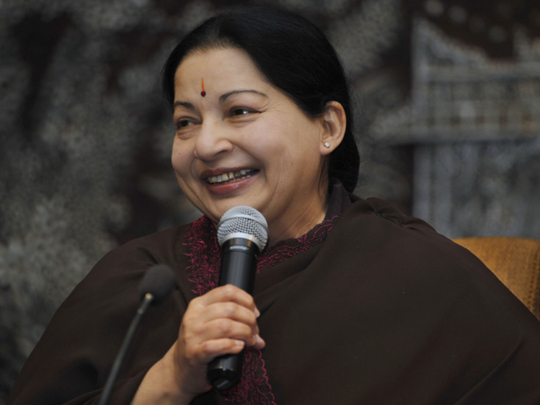
The death of Jayalalitha Jayaram after months of illness has left a big political void in the southern Indian state of Tamil Nadu where she ruled as the chief minister for almost 15 years. Tamil Nadu is one of the most progressive states — both in terms of economic and social parameters — and the credit goes to Jayalalitha and her political rival M. Karunanidhi, the two regional stalwarts who ensured political stability and progress. The state has more than 550 engineering colleges and 110 manufacturing clusters and is one of the highest spenders in public welfare.
Jayalalitha, or ‘Amma’, mother in Tamil, commanded immense respect among her followers, admirers and her party colleagues. Politically, she drew immense clout at the national level through the 50 members of parliament from her party All India Anna Dravida Munnetra Kazhagam. The ruling Bharatiya Janata Party depends on her support to pass key legislations in parliament. On several occasions, she had played the role of a kingmaker at the federal level.
Her successor will find it hard to fill her shoes. Ottakara Panneerselvam, the new Chief Minister lacks her charisma and clout to effectively govern and keep the party together. In her absence, Tamil Nadu politics is expected to evolve in the coming months as her rival from the Dravida Munnetra Kazhagam party, M. Karunanidhi, who is in his 90s, also has no clear successor.
Jayalalitha was just 16 when she made her film debut on the advice of M.G. Ramachandran, or MGR, who became her mentor in the film industry and later when she joined politics. After MGR’s death in 1987, she fought a bitter succession battle with her mentor’s wife, a struggle that led to a split in the party. Since then, she grew politically and led her party to several electoral victories.
Jayalalitha’s personality was a bundle of contradictions that an outsider may find baffling. For instance, to her followers, she was the mother, some called her welfare queen as her projects touched millions of lives in the state. From mixer-grinders, television sets to cheap meals at Amma Canteens, she stood by the poor. Yet, she was compared to Imelda Marcos for her fabled collection of saris and jewellery, at a time when she drew a token salary of only one rupee. Also, she was jailed after the courts convicted her of corruption. Still, her sentence and excesses had little impact on her fans, including cabinet ministers who prostrated before her.
‘Amma’ leaves a legacy that has no parallel in south India. She was charismatic and yet controversial. She was immensely popular, yet aloof — inaccessible to people, her party colleagues and media.








